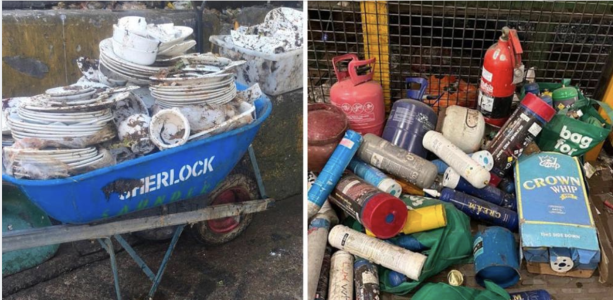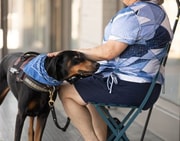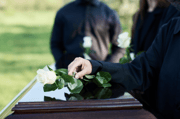‘The whole place was cordoned off’: Shocking discoveries in Aussie recycling bins prompts warning from authorities
It’s common knowledge to many that recycling isn’t just good for the environment–-it's an essential practice if we want to help save our planet.
However, it seems that a shocking number of people don’t quite understand how some things should be recycled or which items are eligible for recycling.
One recycling and waste management firm, Veolia, has gone so far as to reveal the unbelievable–and rather disturbing—tales of the items they’ve found in Aussie households’ recycling bins over the years.
According to Veolia Chief Operating Officer of Resource Recovery, Craig Barker, this list includes but is not limited to a samurai sword, explosives, a cow cut in half, money, ammunition, a donkey's head, syringes, dead pets, drugs, asbestos and a car engine.
‘We even had something a few years ago that looked like a fully wired bomb at our Clyde transfer station in NSW,’ Craig Barker said.
‘That saw the whole place cordoned off, and the bomb squad called in.
‘It turned out to be a very realistic-looking movie prop. These all make for good stories, but the other side of the coin is that many of these items can put the people in our sorting facilities at risk.’
‘So, putting the right rubbish in the right bin isn’t just important for recycling and sustainability, it matters for the safety of the people working in the industry too.’
Despite the good intentions of most households when it comes to recycling, a variety of common mistakes can inadvertently jeopardise the process.
These errors not only carry potential dangers but also contribute to recyclable materials ending up in landfills rather than being repurposed.
‘We call it “wish-cycling”, which is when someone isn't sure but hopes something they put in the bin can be recycled,’ Mr Barker added.
‘Empty barbecue gas bottles are one of the common and yet dangerous items that get ‘wish-cycled’ into our bins, along with vapes, batteries and small electrical goods. All have the potential to cause explosive fires in trucks and landfills. None should be put in any kerbside bin in the first place.’
‘Textiles, like old clothes, also pose a danger in the yellow bin, especially when they get tangled in the sorting machinery, which brings it to a grinding halt. The only way to remove textiles is to shut down operations and carefully disentangle them, which can take some time.’
Video source: Facebook/VeoliaANZ
What you can do
Annually, Veolia's household recycling facilities in Australia handle over 160,000 tonnes of recyclable material. Properly sorting your waste into the right bin truly makes a significant impact.
‘At the same time, Australia landfills 27 million tonnes of waste every year,’ Mr Barker added.
‘Landfill generates methane that is 20 times more potent as a greenhouse gas than carbon dioxide. This matters in a climate crisis with droughts, floods and natural disasters growing.’
‘Every time an Australian family puts the right rubbish in the right bin, they are reducing landfill and playing their part in ecological transformation and the battle against climate change.’

Members, how does this story resonate with you? Any ideas on spreading the recycling know-how to our fellow Aussies? Drop your tips in the comments!
However, it seems that a shocking number of people don’t quite understand how some things should be recycled or which items are eligible for recycling.
One recycling and waste management firm, Veolia, has gone so far as to reveal the unbelievable–and rather disturbing—tales of the items they’ve found in Aussie households’ recycling bins over the years.
According to Veolia Chief Operating Officer of Resource Recovery, Craig Barker, this list includes but is not limited to a samurai sword, explosives, a cow cut in half, money, ammunition, a donkey's head, syringes, dead pets, drugs, asbestos and a car engine.
‘We even had something a few years ago that looked like a fully wired bomb at our Clyde transfer station in NSW,’ Craig Barker said.
‘That saw the whole place cordoned off, and the bomb squad called in.
‘It turned out to be a very realistic-looking movie prop. These all make for good stories, but the other side of the coin is that many of these items can put the people in our sorting facilities at risk.’
‘So, putting the right rubbish in the right bin isn’t just important for recycling and sustainability, it matters for the safety of the people working in the industry too.’
Despite the good intentions of most households when it comes to recycling, a variety of common mistakes can inadvertently jeopardise the process.
These errors not only carry potential dangers but also contribute to recyclable materials ending up in landfills rather than being repurposed.
‘We call it “wish-cycling”, which is when someone isn't sure but hopes something they put in the bin can be recycled,’ Mr Barker added.
‘Empty barbecue gas bottles are one of the common and yet dangerous items that get ‘wish-cycled’ into our bins, along with vapes, batteries and small electrical goods. All have the potential to cause explosive fires in trucks and landfills. None should be put in any kerbside bin in the first place.’
‘Textiles, like old clothes, also pose a danger in the yellow bin, especially when they get tangled in the sorting machinery, which brings it to a grinding halt. The only way to remove textiles is to shut down operations and carefully disentangle them, which can take some time.’
Video source: Facebook/VeoliaANZ
What you can do
Annually, Veolia's household recycling facilities in Australia handle over 160,000 tonnes of recyclable material. Properly sorting your waste into the right bin truly makes a significant impact.
‘At the same time, Australia landfills 27 million tonnes of waste every year,’ Mr Barker added.
‘Landfill generates methane that is 20 times more potent as a greenhouse gas than carbon dioxide. This matters in a climate crisis with droughts, floods and natural disasters growing.’
‘Every time an Australian family puts the right rubbish in the right bin, they are reducing landfill and playing their part in ecological transformation and the battle against climate change.’
Key Takeaways
- Recycling and waste management company Veolia has revealed bizarre and disturbing items found in Australian recycling bins over the years, including a samurai sword, a cow cut in half, a donkey's head, and a realistic-looking bomb prop.
- Many of these items can pose significant risks to workers at sorting facilities and can also lead to recyclable items going to landfills because of contamination.
- A common mistake, termed ‘wish-cycling’, is when individuals put items in the recycling bin hoping they can be recycled, such as empty barbecue gas bottles, vapes and batteries, all of which can cause explosive fires in trucks and landfills.








